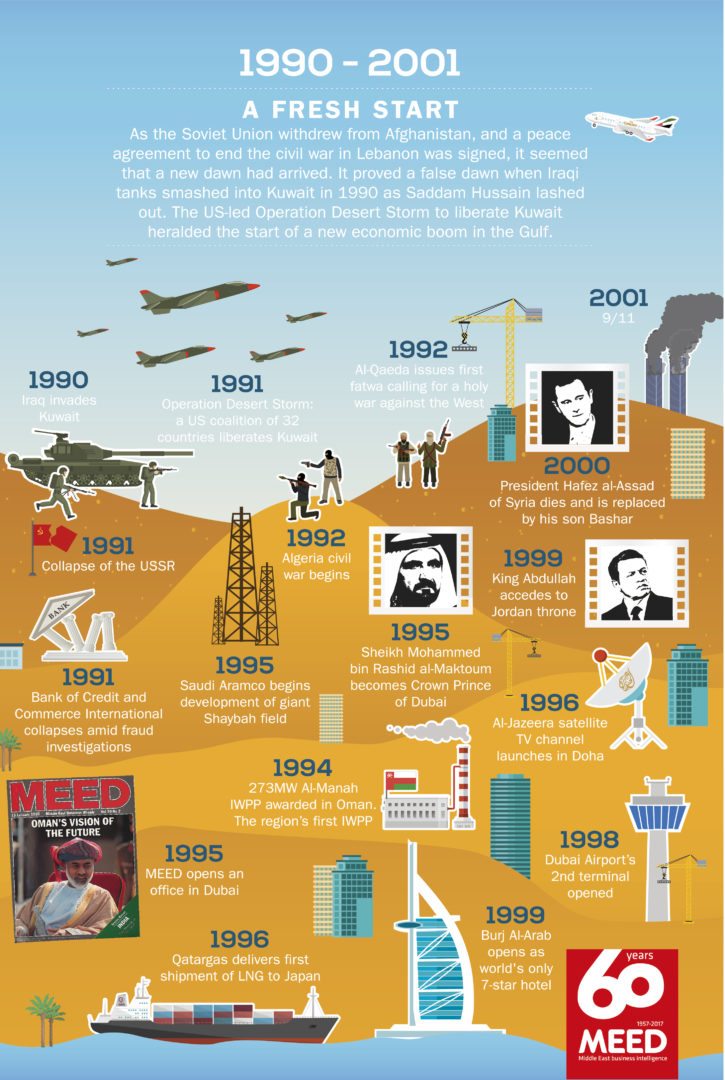

As the Soviet Union withdrew from Afghanistan and a peace agreement to end the civil war in Lebanon was signed, it seemed that a new dawn had arrived. It proved a false down when Iraqi tanks smashed into Kuwait in 1990 as Saddam Hussein lashed out. The US-led operation Desert Storm to liberate Kuwait heralded the start of a new economic boom in the Gulf
After the lost decade of the 1980s, it seemed the region could at last look forward to a fresh start following the Soviet Unions withdrawal from Afghanistan in 1988, and a peace agreement to end the civil war in Lebanon was signed in October 1989.
However, it quickly proved to be a false dawn, when, in an unexpected night attack on 1 August 1990, Iraqi tanks smashed into Kuwait as Saddam Hussein followed through on a year of bluster and violent threats.
The US-led liberation of Kuwait was brief and contained, but following the 1991 Gulf War, it became clear that the Middle East had undergone a profound personality change. With communism dead and Arab nationalism discredited, new forces were on the rise to fill the political vacuum they left behind.
Political reforms were launched in Bahrain, Kuwait, Oman and Saudi Arabia as Islamist movements started to assert themselves in Algeria, Egypt and Turkey. But the big political development of the period was the launch of the Arab-Israeli peace process in Madrid in October 1991, which saw Israel and the Palestine Liberation Organisation agreeing to normalise relations between Tel Aviv and the Palestinian national movement. Thirteen months later, Jordan signed a peace treaty with Israel.
Squeezed by a decade of low oil prices, financial pressures on oil exporters were the primary economic issue as Algeria teetered on the brink of bankruptcy and the coming to power of an elected Islamist government was only prevented by force.
Most countries in the region signed up to IMF-prescribed economic reform programmes, declaring their intent to privatise their economies more thoroughly. International investors began to view the region as a place to put their money.
But the stagnation of once-powerful economies such as Egypt and the growing threat from Islamist movements cast a malaise over the region at the start of the new century, even as oil prices began to lift, and a more pragmatic US administration took office. In Palestine, the peace process broke down, leading to the second Al-Aqsa intifada (uprising) in 2000. Then, on 11 September 2001, terrorist attacks on New York and Washington shook the world and the US declared a global war on terror.
10 May 1957
Iraqi government drafts a trade agreement with Saudi Arabia
14 May 1965
Arab states break off relations with West Germany after Bonn recognises Israel
26 May 1981
The first GCC meeting is held in Abu Dhabi
4 May 1990
Lebanons army commander Michel Aoun and Christian militia leader Samir Geagea compete for Damascus attention
18 May 2001
Irans President Mohammad Khatami signs up as a candidate for the latest presidential polls
15 May 2009
Dubais Nakheel in talks with banks to delay repayments on $1.2bn loan

MEED 1990-2001 infographic
MEED 1990-2001 infographic
You might also like...

Iraq oil project reaches 70% completion
26 April 2024

Samana announces $272m Dubai Lake Views project
26 April 2024

Iraq signs deal to develop the Akkas gas field
25 April 2024

Emaar appoints beachfront project contractor
25 April 2024
A MEED Subscription...
Subscribe or upgrade your current MEED.com package to support your strategic planning with the MENA region’s best source of business information. Proceed to our online shop below to find out more about the features in each package.








